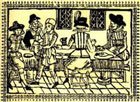
Welcome to the 70th weekly Tar Heel Tavern.
Last week's Tavern led me to think about "quality of life" as a theme for this week. It's something I think about a lot, a fundamental value that guides my life and my blogs. To keep the mood light for Tavern guests, I suggested a variety of qualities, ranging from bright shiny crunchiness to good food and good photos.
Good food and photos come to us from Moomin Light. Strawberries, blueberries, and apples picked fresh in the North Carolina mountains--what a wonderful way to appreciate quality.
Taking a rest from walking in those mountains, Waterfall at A Sort of Notebook offers a photo of part-time bobcat, Beau, demonstrating the art of lounging. Dogs and cats really know how to relax completely, don't they?
Over at the coast, however, one dog isn't relaxing, and neither is the crab it found on the beach. Sometimes one view of quality conflicts with another view, doesn't it? Mandie, at Captivated by... assures us that no crabs were harmed during the production of this video. There is, however, no word about what happened at dinner.
You might want to keep that dog and crab relationship in mind as you consider George's comment about the relationship of elected officials to their constituents, especially when it comes to email. (Email about quality of life, perhaps?) There's more quality George at dirtygreek.org.
Dan, from BlueNC, sent a letter to an Asheville editor about an elected official and the quality of health care for veterans. He thinks his letter may not be published in his local newspaper, but it's online at BlueNC.
Also at BlueNC, Lance unveils a new database of North Carolina blogs. It's colorful, taggable, searchable, self-serviceable, and now available. Lance hopes a "free 'n' easy" blog database will contribute to the quality of blogging life.
Alex Wilson, who has a studio named after him, also unveils a web project this week. Carrboro Hill is a "community wiki", a collaborative way to document all the qualities of life in Carrboro and Chapel Hill. And if you can spare the bandwidth, his song Untitled Pretention Pontificated by a Passive Voice offers sunny advice to us writers.
Titled without pretention and announced at a reasonable volume, Tavern newcomer Jerry, at idiom savant, says he's proud to be an introvert despite living in a world of extroverts. And he is not bemused...or is he?
Regular readers know what to expect when they open a window into the mind of Anonymoses. Irregular readers are advised to fasten their seatbelts and to keep their hands and feet inside the ride at all times. It's about quality, not quantity. "Love everything that breathes," he advises.
It's dusk now as I write. A barred owl wails, "Who?" outside my window as I quote Anon: "Love everything that breathes." I go outside to reassure the owl, "You!" but it's gone. It doesn't trust us, I guess. It may take us a while to undo the sad track record of our own species.
It might help if we have a clearer vision of what we care about most. Billy, the Blogging Poet writes about someone who lives with a clear guiding vision in The Ballad of Crunchy Corn. The title character (Crunchy, not Billy...or is it? hmmmm....) knows exactly what constitutes a satisfying quality of his life, and he doesn't allow Congresspersons or cornstalks to interfere.
Unfortunately insomnia can interfere with bloggers' quality of life. That's been a recurring subtext recently, a not so pleasant quality of our lives. Coturnix studies the science of sleep, but apparently doesn't sleep himself. Oh, he claims to sleep, but I doubt that sleep is compatible with his attempt to set the land speed record of blogging. (Over 100 posts in ten days, and that's just a practice lap.) One of those umpty-thousand posts recalls his recent visit to New York. His quality time with his family included the Broadway show, Spamalot, based on Monty Python comedy.
The Monty Python reference is important because it sets up this transition joke about...
(wait for it...)
The Comfy Chair!
(Well, it's hysterically funny when it plays in my head. For the Python-challenged, there's a brief explanation here, with the full Monty here.)
At any rate, Erin's solution for insomnia turned out to be a new office chair.  If you examine the photo you may ask yourself, as other readers asked, "How does one sit on that thing?" And Erin would explain, "Like this." The key, in her case, is that her funky chair encourages good circulation that prevents nighttime restless leg syndrome. Feel free to visit Poetic Acceptance to admire her comfy chair, but please don't wake her up. A good night's sleep is improving the quality of her life.
If you examine the photo you may ask yourself, as other readers asked, "How does one sit on that thing?" And Erin would explain, "Like this." The key, in her case, is that her funky chair encourages good circulation that prevents nighttime restless leg syndrome. Feel free to visit Poetic Acceptance to admire her comfy chair, but please don't wake her up. A good night's sleep is improving the quality of her life.
When the tense geopolitical situation keeps him up at night, Screwy Hoolie says Drinking Liberally works for him. More at Scrutiny Hooligans...
Iddybud recommends simple things. Grape Crush. A creamsicle. Oh, and a musician named Alexi Murdoch. Also Bruce Springsteen. And....a few other things, too.
A few other things happened in the world this week, of course, including at least three Sporting Events with Capitalized Titles. One of them culminated in a bright, shiny cup and considerable attention for lil ol' Raleigh. At 2sides2ron, that's just the beginning of a journey that explores qualities of life. From Raleigh, Ron jumps in time and space to a French ice rink, then to a Caribbean cruise ship, with stops for chicken livers, Portugese vocabulary, and the wonder of friendship.
That's a lot to follow. So I'll just close by sharing a question that I've been thinking about this week:
How would we live if the phrase, "And we all lived happily ever after..." began a new story?

